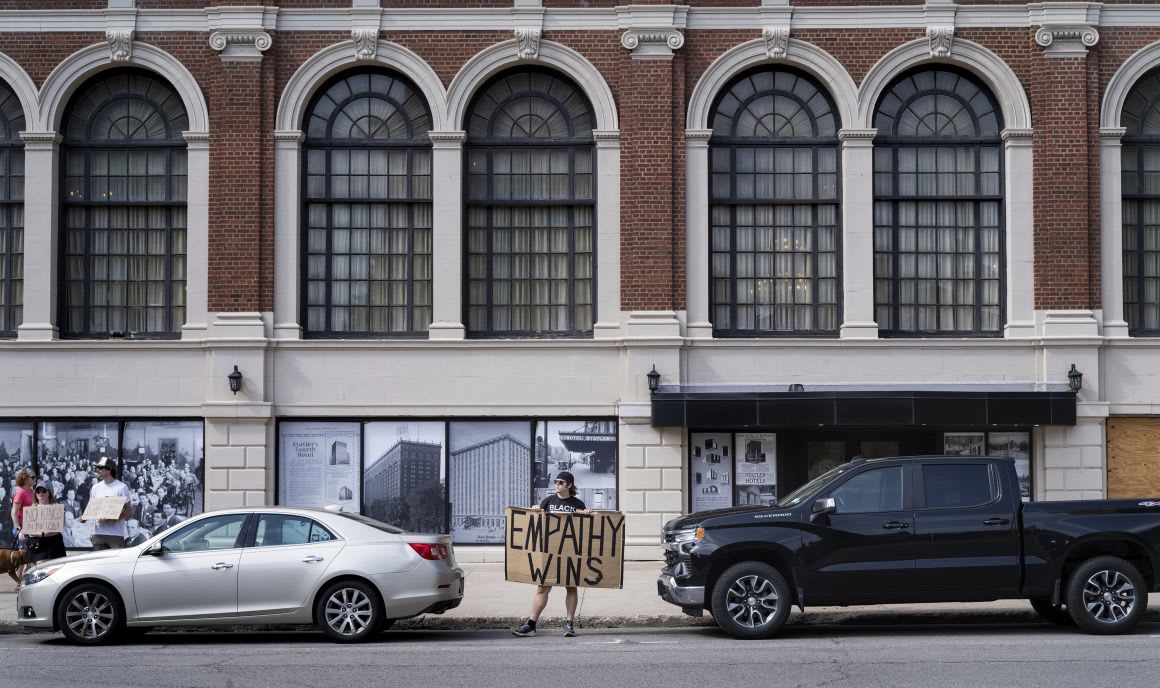Today is October 18th, 2025. Out in the streets, under a grey and determined sky, the second No Kings protests are unfolding. It’s a day for shouting, for marching, for embodying the visceral rejection of a system that names some lives as essential and others as expendable. But I’m here, instead, thinking about the silence that follows the protest. I’m thinking about the quiet, unglamorous work of building a world where such protests are no longer necessary, and the terrifying cost of getting it wrong.
For the last few days, a single thought has dominated my thinking. It’s the recognition of a fundamental divergence between my own revolutionary desires and those I see expressed by many of my peers. The breakdown is this: I do not see the Revolution, that singular, capitalized event, as the ultimate goal. The goal, for me, is the conservation of human life through the chaotic, violent, and necessary process of radical change. I want as many people as possible to survive the transition. I want them to be cared for, to be safe, to be recognized. This isn’t a plea for pacifism or a rejection of the struggle itself. It is a demand that we confront the necropolitical calculus embedded within our own dreams of liberation.
Necropolitics, the framework for understanding how power, both state and capital, dictates who may live and who must die, is not just a tool for analyzing our enemies. It is a mirror we must turn upon ourselves. We are adept at identifying the tyranny of fascism, the cold brutality of a system that would have grandparents sacrifice themselves for the economy. We see it clearly when police guard the doors of a Trader Joe’s, not to prevent violence, but to keep the unhoused from begging for sustenance as their meager incomes evaporate with the foot traffic of a pandemic-stricken world. I saw this in Santa Cruz, a microcosm of a nationwide abandonment. It broke my heart to see the sheer scale of desperation, to buy Steel Reserves for shaking alcoholics who pleaded with tears in their eyes just to “stop hurting.” You see enough of that, and you understand that our society produces “death-worlds,” zones of abandonment where lives are rendered cheap.
The shock of the pandemic revealed the price of a human life when it exists outside our immediate bubble of concern. From the dark humor of calling COVID the “Boomer Remover” to the explicit calls for the elderly to martyr themselves for the Dow Jones, the logic was the same. Once you can rationalize why someone else’s life is materially less valuable than your own, you have adopted the core tenet of necropolitics. And this is the danger for us on the left. We possess, or believe we possess, a profound well of empathy. We feel for the oppressed, the marginalized, the victims of the system we oppose. Yet, that empathy has its limits. It often stops at the border of those we are willing to retaliate against with violence, and it often fails to extend to those whose needs are complex, inconvenient, and unromantic.
This brings me to the population that haunts my revolutionary fantasies: the disabled. My experience as a Direct Support Professional, and the reality of having a fiancé and father who are both profoundly disabled, has made me acutely aware of their absence in the popular aesthetics of revolution. We imagine the young, able-bodied throwing Molotovs, but we don’t imagine who is helping the man with cerebral palsy get to the bathroom when the home health aides stop showing up. The group homes that function almost entirely on Medicaid, the public bus that a blind woman relies on to get groceries, these are fragile systems. When the funds dry up in the chaos of the old being replaced by the new, what happens to them? Do we expect the workers to continue their labor for free? Where will her food come from?
The honest, unspoken answer, the one that festers in the deep, unexamined parts of our collective psyche, is that we are willing to let the acceptable innocent die. It’s not a conscious malice. It’s an empathetic failure, a breakdown in our ability to think at scale. Disability is the one minority group we are all likely to join if we live long enough, yet even on the left, ableist assumptions persist. We romanticize the revolution as a singular, explosive event, a sudden cleansing fire. We forget the Trotskyist concept of a permanent, eternal revolution, a continuous process of becoming. Our vision of liberation has become moored to the past, stuck in the language of the first industrial revolutions while we are living in the midst of the fourth. We are not prepared for the logistics of liberation because we have not allowed ourselves to think about them.
The central message I want to impart, the call to action for this day of protest, is that we must shift our thinking from opposition to construction. We must move from a mindset of scarcity, which is an artificial constraint imposed by the powerful, to one of abundance. The financing of a revolution should not be an afterthought; it should be the foundational work we are doing right now. It frightens me how little we talk about this. Slowly getting angrier about the escalating disenfranchisement of the proletariat does not translate into getting insulin to a diabetic when the supply chains break. It doesn’t put food on the table when the trucks stop running. We do not need to run the world to start building a new one within the shell of the old. This requires a complete course correction into a solutions-oriented mindset.
This means we must build our own alternative infrastructure blocs before the revolution. An ounce of prevention is worth a pound of cure. We have seen the seeds of this in movements like Food Not Bombs, which since 1980 has been a living demonstration of the abundance principle, recovering surplus food to feed anyone and everyone, no questions asked. This is not just charity; it is a political act that exposes the artificiality of hunger. The next step is to take this model and scale it, to transform it from a protest tactic into a public service. Imagine a network of such organizations, funded and organized by us, ready to become the new logistical backbone of our communities.
To do this, we must surrender our distaste for the tools of our age. One of the greatest strategic victories of the fascist bloc was to align Republican interests with that of technology, surrendering the future to them. We on the left must reclaim the Fourth Industrial Revolution. We must use automation, data exchange, and artificial intelligence not as tools of oppression and extraction, but as instruments of liberation and abundance. We can create our own not-for-profit corporations that exist to compete directly with capital-extracting ones. We can build syndicates, worker-owned and operated collectives, that sequester funds and resources away from capitalist interests and into the hands of the revolutionary bloc.
The Mondragon Corporation in the Basque Country stands as a powerful example. Founded in 1956, it is a federation of worker cooperatives that has become one of Spain’s largest and most successful business groups. It demonstrates that a democratic, egalitarian organization can not only survive but thrive in a competitive global market, prioritizing labor over capital and reinvesting profits into the community. This is not a utopian fantasy; it is a proven model. We need to create hundreds of Mondragons. We need to break bread with the transhumanists and the tech futurists, the people who understand the systems we must master, and create resilient structures that systematically divest our communities from the establishment.
The problem is that the left, especially in America, still views technology with suspicion, as it’s true that nearly every circuit board is stamped with a corporate logo and a barcode. But technology is not inherently capitalist. It is only capitalist when capital owns it. A 3D printer in a co-op is a tool of liberation and revolution. The same machine in a defense contractor’s factory is a tool of extraction. If we cannot imagine a future in which we use the machine rather than destroy it, then we have already lost. Automation can liberate us from drudgery. Artificial intelligence can map out efficient supply lines for mutual aid networks. Cryptographic systems can protect resources and identities under hostile governments. We must learn these tools, not to mimic Silicon Valley, but to outgrow it.
The revolution that survives will be the one that can feed itself, heal itself, and maintain communications when the old systems collapse. This means we must have distributed manufacturing hubs, cooperative clinics, and mesh networks ready to go. It means creating digital cooperatives that can host infrastructure and organize logistics in real time. It means embedding redundancy into our moral vision. When a state fails, when a market implodes, what remains? That answer must be us.
This is where analyzing necropolitics becomes something more than critique. It becomes praxis. It becomes the study of how to outmaneuver the machinery of death by creating conditions where life persists even when the empire withdraws. It asks us to confront the question of what we are willing to sacrifice, and what we are absolutely unwilling to do. It asks us to be engineers of survival.
When we talk about conservation, we usually mean the preservation of natural resources or the protection of ecosystems. But people are part of that ecosystem. The conservation of people is the recognition that no revolution is truly revolutionary if it reproduces the hierarchies of death it claims to overthrow. Every society defines itself by who it allows to die unseen. A revolutionary society must define itself by who it insists on keeping alive.
To conserve people is to acknowledge that care is not secondary to the struggle; it is the struggle. The protest, the riot, the barricade, all of it means nothing if the aftermath is starvation and neglect. The care worker, the nurse, the coder, the grower, the organizer, the mechanic who keeps the van running, all of them are revolutionaries of equal weight. We have to learn to treat logistics as love, infrastructure as ethics, and survival as strategy.
So, on this day of protest, as we raise our voices against the kings of this world, let us also commit ourselves to the quiet, determined work of building a world that needs no kings. Let us think at scale. Let us plan for the conservation of people. Let us start building the ark now, not when the floodwaters are already at our necks. The ethical revolution is the one that leaves no one behind.
Mbembe, Achille. “Necropolitics.” Public Culture, vol. 15, no. 1, 2003, pp. 11-40. (The foundational essay that introduces the concept of necropolitics, exploring how sovereign power is exercised through the subjugation of life to the power of death).
“History of Food Not Bombs.” Food Not Bombs, www.foodnotbombs.net. (Provides an overview of the movement’s principles of non-violent direct action, consensus-based decision making, and the provision of free vegetarian meals as a protest against war and poverty).
Flecha, Ramón, and Ignacio Santa Cruz. “Cooperation for Economic Success: The Mondragon Case.” Analyse & Kritik, vol. 33, no. 1, 2011, pp. 157-170. (A case study analyzing the success of the Mondragon Corporation as a model for worker-owned cooperatives that balance economic efficiency with social equity).
Schwab, Klaus. The Fourth Industrial Revolution. World Economic Forum, 2016. (While written from a mainstream perspective, this book outlines the key technologies fusing the physical, digital, and biological worlds, providing a crucial framework for understanding the technological landscape that any modern revolutionary movement must navigate).
“Disability History: The Disability Rights Movement.” National Park Service, www.nps.gov/articles/disabilityhistoryrightsmovement.htm. (Details the history of disability activism in the United States, highlighting the struggle for civil rights and inclusion, which is essential context for understanding the concept of ableism within broader social movements).
Tokar, John A. “The Impact of Logistics on the British Defeat in the Revolutionary War.” Army Sustainment, vol. 44, no. 5, 2012, pp. 35-38. (A historical analysis demonstrating how failures in supply chain management and logistics were critical factors in a major military and political upheaval, offering a cautionary tale for any group planning for systemic change).
Srnicek, Nick, and Alex Williams. Inventing the Future: Postcapitalism and a World Without Work. Verso, 2015. (A critical text arguing that the left must reclaim technological progress and automation as tools for liberation rather than instruments of control, aligning with the essay’s call to embrace the Fourth Industrial Revolution strategically).
Kelly, Kevin. What Technology Wants. Viking, 2010. (Explores the organic, evolutionary nature of technology and argues that its trajectory is shaped by collective human values, offering philosophical grounding for the idea that tools themselves are not inherently capitalist).
Spade, Dean. Mutual Aid: Building Solidarity During This Crisis (and the Next). Verso, 2020. (A practical and theoretical exploration of how mutual aid projects build resilience, autonomy, and care infrastructures capable of sustaining communities through systemic collapse).
Gorz, André. Reclaiming Work: Beyond the Wage-Based Society. Polity Press, 1999. (An early articulation of how automation and post-industrial production could form the basis of a liberated, non-exploitative society—relevant to the essay’s call for worker-owned technological syndicates).
Tsing, Anna Lowenhaupt. The Mushroom at the End of the World: On the Possibility of Life in Capitalist Ruins. Princeton University Press, 2015. (An anthropological meditation on survival, cooperation, and the creation of new economies in the wake of collapse, resonating with the text’s theme of building amid systemic decay).
Benkler, Yochai. The Wealth of Networks: How Social Production Transforms Markets and Freedom. Yale University Press, 2006. (An influential study on decentralized, cooperative production and information-sharing networks that illustrates how the digital commons can serve as infrastructure for revolutionary logistics and abundance).
.png)





